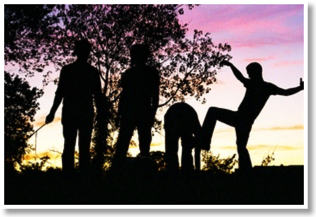Sleep Whale
Sleep Whale
The Parish
Austin, Texas
 Houseboat, the debut full-length from Denton’s Sleep Whale, is a kaleidoscopic dreamscape of found sound and texture. The moaning cello, plucky acoustic guitar, field recordings and driving drums undulate, with one element never overpowering the others to create the ethereal, calming effect of waves lapping at a shore or the cozy patchwork of a quilt. The stately setting of the Parish – baroque wallpaper, chandeliers and candle scones with fake flames – may have been an odd pairing for the experimental band with arrangements that are more natural than feigned. But, when the bathroom stalls only have the words “Love, love, love, love” etched on them, it’s not as incongruous as it initially seems as the music mimics the listless abandon on, well, a houseboat.
Houseboat, the debut full-length from Denton’s Sleep Whale, is a kaleidoscopic dreamscape of found sound and texture. The moaning cello, plucky acoustic guitar, field recordings and driving drums undulate, with one element never overpowering the others to create the ethereal, calming effect of waves lapping at a shore or the cozy patchwork of a quilt. The stately setting of the Parish – baroque wallpaper, chandeliers and candle scones with fake flames – may have been an odd pairing for the experimental band with arrangements that are more natural than feigned. But, when the bathroom stalls only have the words “Love, love, love, love” etched on them, it’s not as incongruous as it initially seems as the music mimics the listless abandon on, well, a houseboat.
The band, expanded to a quartet from the original duo, was able to translate the buoyant flow of their debut to the live setting. The sounds of water moving, bubbling and dripping dressed the arrangements and acted as transitions in-between the songs. The instrumentals were such seamless testaments to atmosphere that when the vocal tracks arrived, it was almost unnecessary. But instead of demanding attention to the words, the vocals were hazily obscured with reverb, becoming another piece of fabric of the quilt. “Cotton Curls” coasted with shimmering acoustic guitar, flirting electronics, distant “oohs” and cymbal crashes that conjured splashes.
The psych-folk-pop charm of set closer “We Were Dripping” was a cinematic treat. Bubbles popped in time. The light tapping of the cymbals sounded like rain falling on them. The guitar work anchored the track with its idyllic presence. “La-la’s” and a wistful violin made the song as personal as a diary entry: “There’s magic in everything. And we were wet and we were dripping.” The unassuming fog machine spurted out smoke amidst red and blue lights that flooded the stage and revolved around like a lighthouse. Once the song faded, the 4/4 bump of club music could be felt underneath, effectively ending the fanciful experience for a small, but dedicated crowd.
by Joshua Barajas
The Parish
Austin, Texas

The band, expanded to a quartet from the original duo, was able to translate the buoyant flow of their debut to the live setting. The sounds of water moving, bubbling and dripping dressed the arrangements and acted as transitions in-between the songs. The instrumentals were such seamless testaments to atmosphere that when the vocal tracks arrived, it was almost unnecessary. But instead of demanding attention to the words, the vocals were hazily obscured with reverb, becoming another piece of fabric of the quilt. “Cotton Curls” coasted with shimmering acoustic guitar, flirting electronics, distant “oohs” and cymbal crashes that conjured splashes.
The psych-folk-pop charm of set closer “We Were Dripping” was a cinematic treat. Bubbles popped in time. The light tapping of the cymbals sounded like rain falling on them. The guitar work anchored the track with its idyllic presence. “La-la’s” and a wistful violin made the song as personal as a diary entry: “There’s magic in everything. And we were wet and we were dripping.” The unassuming fog machine spurted out smoke amidst red and blue lights that flooded the stage and revolved around like a lighthouse. Once the song faded, the 4/4 bump of club music could be felt underneath, effectively ending the fanciful experience for a small, but dedicated crowd.
by Joshua Barajas


